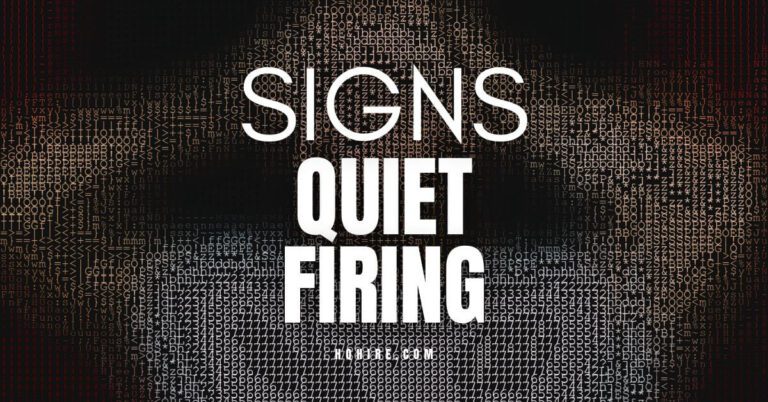Most employees want to be valued, no one is perfect and everyone makes mistakes from time to time.
However, consistently making mistakes and underperforming at work may be a warning sign of poor performance which should be addressed quickly.
Falling short of the productivity expectations set by the business can spell trouble. If left unattended this soon could develop into a significant issue that can affect the entire well-being of a team.
Signs of Poor Performance At Work
Poor work performance can be defined by a multitude of behaviors and factors that are visible to the employer and employees. These can be split into two categories: work-related and people-related signs.
The most common work-related signs of poor work performance include the employee invoking multiple customer complaints or displaying an aggressive work attitude. However, not all signs are as obvious as these, some are subtle and can be hard to detect.
Although poor performance is often due to poor leadership, lack of empathy or a leadership style that is not desirable, understanding the signs of poor performance at work can help both employees and employers to perform better for the team.
Identifying Work-Related Signs of Poor Performance
1. Invokes Customer Complaints
An employee who continually upsets and invokes customer complaints is one that is most likely displaying a poor work ethic.
After all, while there are some customers who will complain about anything, if your one employee seems to be racking up numerous complaints, they are most likely not striking to help the customer with their needs.
This might not only leave a poor taste in your customers’ mouths about your organization, but it can also discourage them from returning for future services.
2. Wastes Company Time
When a good employee is working on company time, they will more often than not try to optimize their time in order to optimize company time.
This means that employees that show up and waste company time also indicated that these workers are, unfortunately, displaying a poor work ethic.
Some common examples of wasting company time include:
- When an employee spends time on their phone or on social media instead of being productive.
- When an employee spends more time standing around talking with other employees than completing their work.
3. Showing Up Late
Showing up late is another trait of employees who display a poor work ethic.
When your employee shows up late, this also indicates that they do not respect you or your time.
Take note, however, that sometimes being late does occur. This trait is only a sign of poor work ethic if it occurs on a regular basis and with no valid or legit excuse.
4. Calling In Sick On A Regular Basis
An employee who also calls in sick on a regular basis is another sign that your employee may be starting to display signs of poor work ethic.
While your employee may truly be under the weather, use your discretion to determine whether they are actually sick or just using this as an excuse to not show up for work.
If calling in sick is a recurring pattern of conduct, it must be addressed.
Even if it is a one-time incident, you should still speak with the employee to determine the cause and make sure they are okay or whether they are faking.
5. The Employee Makes A Lot Of Excuses
Excuses for bad behavior can range from absurd to ordinary – but regardless of their plausibility, they always have the same purpose: to divert the manager’s attention away from the fact that an employee failed to complete a task.
While a one-time occurrence may be overlooked, a team leader or manager cannot accept excuses for recurrent performance issues.
When excuses are permitted, other employees immediately notice.
After all, tolerating excuses fosters an avoidance culture rather than one of responsibility.
Identifying People-Related Signs of Poor Performance
1. Disgruntled Peers
Humans ought to be treated with respect by other people. While this trait should be practiced in public, it should also be enforced in the workplace.
Respect is treating your coworkers and bosses professionally and refraining from making negative comments about their feeling of self-worth, confidence, or community.
When an employee begins to disregard the respect, they have for other employees and employers, this can cause a disruption in the workplace.
After all, you may be faced with disgruntled peers who could refuse to work the same shifts as the individual, creating a toxic workspace.
2. Displays a Negative Attitude
If your employee displays a negative attitude, this can be another personal-related sign that this individual could also have a poor work ethic.
After all, a negative attitude goes hand in hand with not caring about your efforts.
3. Shows A Lack Of Engagement
A lack of engagement can also be an indicator that this employee may develop a poor work ethic. For example,
- If your employee tends to be distracted, this displays a lack of engagement which can result in the individual having a lack of passion for their work.
What you want instead are employees who are engaged in their work. For example,
- Positive work ethics are demonstrated by being enthusiastic about each day of work and what it has in store for you. This implies that the individual is eager to take on new tasks and prepared to overcome any hurdles.
4. Exhibits Passive-Aggressive Behavior
Any boss or HR representative may experience extreme frustration while dealing with a passive-aggressive employee. For example,
- In the workplace, passive-aggressive conduct can be distracting, unproductive, and unpleasant, affecting productivity and adding to the workload for others.
While it can be challenging to deal with a passive-aggressive individual in the workplace, especially since the conduct is frequently concealed, it is essential that it is handled as soon as possible.
After all, ignoring the problem won’t make it go away; until it’s dealt with, this person will probably continue to annoy and disturb the company or other employees in the department, creating a toxic workspace.
5. Resents Authority Figures
Another personal-related sign that may indicate a poor work performance from an individual includes having an issue with authority figures.
Overall, this is a sign of a lousy employee.
This kind of worker refuses to follow instructions, calls into doubt the boss’ competence, and openly makes fun of senior management.
Constructive criticism is often regarded with annoyance and defensiveness.
Instead of owning up to errors, the problematic employee claims that the manager failed to provide clear instructions.
Other defining traits include blaming and seeking blame.
What Is Poor Performance At Work?
Poor performance at work often refers to an employee’s conduct within the team, but it can also be related to the tasks and obligations of the position. Poor job performance is by definition when an employee’s efforts fall short of his or her targets or expectations.
Only 50% of employees and executives say they understand the work expectation. While some bad work performance is inadvertent and may be resolved with good supervision, some instances of it represent more serious problems, such as disengagement and how the person feels about their job.
These issues can cause conflict in the workplace, and thus, these people should be treated with care and the issue should be resolved quickly.
Some examples of bad work performance that can be resolved include:
- Making a mistake.
- Mixing up instructions.
On the other hand, some examples of bad work performance that cannot be resolved include:
- Personality traits include being rude or demeaning to other employees.
- A lack of respect for team leaders or owners of the establishment
The most common signs that an employee may have a poor work ethic can include a multitude of customer complaints, wasting company time, showing up late, calling in sick, making excusing, as well as exhibiting negative behaviors, showing a lack of respect, and resenting authority figures.
What Should You Do About An Employee Who Displays Poor Work Ethic?
For HR teams, dealing with poor work ethics can be a huge challenge. After all, if this problem is not addressed right away, it can snowball into a much bigger issue.
If left unattended, other employees may begin to think it’s acceptable for them to break the rules if they observe others doing so with no repercussions. Before you know it, such behavior has become the standard in your organization.
Workplace ethics can be challenging to resolve because, like any other procedure, you must follow the right steps to safeguard your company,
- Provide all parties with an equal opportunity to defend themselves.
- Align with the management team to make sure that the management team is aligned with the expectation
- Provide clear communication to employees on the expectation.
- Any investigation needs to be handled swiftly.
- Regardless matter who violates the regulation, it has to be handled fairly.
HR departments will need to document the incident so that unethical behavior can be scrutinized and eradicated if it is detected in your workplace.
As a leader or a manager, if you experience any issues with an employee, they should be addressed immediately in order to prevent the employee from continuing to display a poor work ethic.
An official process must be in place so that any violation can be investigated in a fair and efficient manner.
Read Also:
- How to Ask Boss to Leave Work Early? (With Examples)
- How to Write a Professional Email At Work (with Examples)
- How to Introduce Yourself at Work on Your First Day (with Examples)
- How to Reply to a Meeting Invitation Request (with Examples)
- How to Call in Sick to Work Professionally: What to Say and Text? (with Examples)
Join over 11,000+ achievers who are committed to achieving their career goals!






